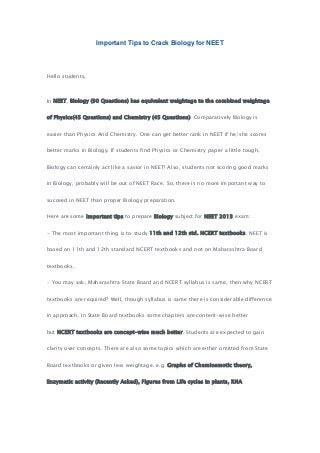
Important tips to crack biology for NEET
- 1. Important Tips to Crack Biology for NEET Hello students, In NEET, Biology (90 Questions) has equivalent weightage to the combined weightage of Physics(45 Questions) and Chemistry (45 Questions). Comparatively Biology is easier than Physics And Chemistry. One can get better rank in NEET if he/she scores better marks in Biology. If students find Physics or Chemistry paper a little tough, Biology can certainly act like a savior in NEET! Also, students not scoring good marks in Biology, probably will be out of NEET Race. So, there is no more important way to succeed in NEET than proper Biology preparation. Here are some important tips to prepare Biology subject for NEET 2013 exam: - The most important thing is to study 11th and 12th std. NCERT textbooks. NEET is based on 11th and 12th standard NCERT textbooks and not on Maharashtra Board textbooks. - You may ask, Maharashtra State Board and NCERT syllabus is same, then why NCERT textbooks are required? Well, though syllabus is same there is considerable difference in approach. In State Board textbooks some chapters are content-wise better but NCERT textbooks are concept-wise much better. Students are expected to gain clarity over concepts. There are also some topics which are either omitted from State Board textbooks or given less weightage. e.g. Graphs of Chemiosmotic theory, Enzymatic activity (Recently Asked), Figures from Life cycles in plants, RNA
- 2. interference, Bryophyte (Recently Asked In PMT), Sliding filament theory, partial pressure of gases etc. There are many difficult concepts which are omitted from Maharashtra Board textbooks. Questions can be asked again on these concepts during NEET. Hence studying NCERT textbooks is a must. - Main differences between NEET and MHT-CET (Old): > One can imagine difficulty level of questions of NEET from papers of All India Entrance Exams conducted till 2012. Even a layman can conclude that NEET 2013 will be more difficult than the earlier MHT-CET. NEET is conducted basically to judge whether students have understood the concepts properly or not. Questions will be more of application type. On the other hand, most of the questions from MHT-CET were factual type and were never applied type. > So NEET will examine your intelligence. Therefore I suggest you all to understand the concepts in each topic of NCERT Text Books. For that matter don’t hesitate to ask your queries to teachers and on ednexa.com. You will definitely get benefited. - Most of the students do practise the chapters they like the most and difficult ones are not practised much. Do exactly opposite of this. Difficult chapters should be prepared first. Make sure you have understood the concepts in all topics. - It is said writing once equals reading 4-5 times. So make practise to prepare notes. It is an art to prepare appropriate notes, especially from difficult chapters.
- 3. - Good diagrams may prove important in Biology. Due to diagrams, concepts are cleared and you can also revise concepts fast. You may get answers of many MCQs from one diagram. So do practise the diagrams. - No doubt, MCQs solving is most important but one has to prepare properly for that subject first. Then you should go for practising maximum MCQs. In short Biology can prove like a saviour in your NEET preparation. Get concepts cleared with the guidance from your subject teachers. You may follow online guidance on www.ednexa.com for notes, diagrams and live webinars (live online lectures). Following these instructions if you start studying for NEET, success is surely yours....! Wish you all The Best!! Dr. Ashutosh Sule www.ednexa.com
